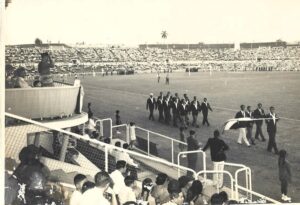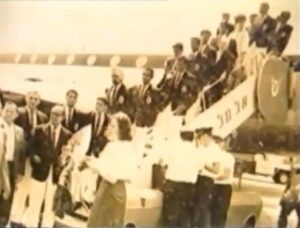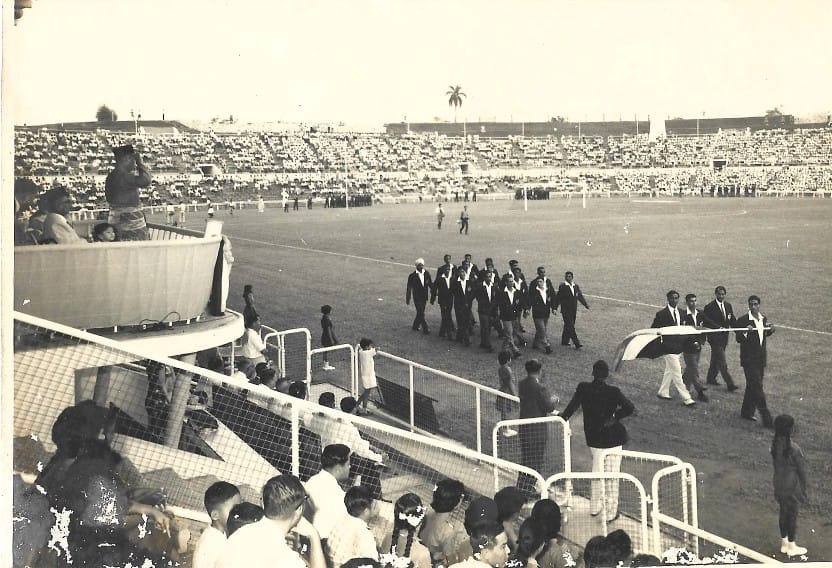
Dubbed a ‘sleeping giant’, India’s football team face high expectations as they kickstart their AFC Asian Cup 2023 campaign against mighty Australia in Qatar on Saturday. Currently ranked 102nd in the FIFA rankings, the Blue Tigers are placed in Group B alongside Australia, Uzbekistan, and Syria. This will be India’s fifth participation in the continental showpiece, with previous appearances having been in 1964, 1984, 2011 and 2019. India’s best performance till date was finishing runners-up in 1964.
Sukumar Samajpati, a member of that 1964 side, heaped praise on Sunil Chhetri. Samajpati, now 84, scored against Hong Kong in India’s final game in that competition, and he believes that Chhetri continues to set the benchmark for India’s modern-day footballers.
“Sunil has passed his prime but still he is our best footballer,” Samajpati told RevSportz in an exclusive interview. “The way he has carried himself both on and off the field is commendable. The way he marshals the whole field and seizes every opportunity to score is brilliant.”
Samajpati suffers from dementia these days, but keeps track of the national side. He has special words of appreciation for Igor Stimac, India’s head coach. “He (Igor Stimac) has changed the mindset of the current players,” said Samajpati. “The players now are self-confident. Exposure of the Indian footballers were very limited in our days. It is good to see our boys getting opportunities to play more international matches. What I like the most about Stimac is he gives a lot of thought about the improvement of the Indian football team.”
Going back down memory lane, Samajpati vividly remembers the reception the Indian football team received once they landed in Tel Aviv. “On our way to Haifa [for their first match], we received the sad news of the passing away of our beloved Prime Minister Pandit Jawaharlal Nehru,” he said. “Our manager, Wing Commander KK Ganguly, shared the news in the team bus. It was unanimously decided that we will go ahead and take part in the tournament. We played the first match against South Korea with black armbands.

“We started the tournament well against South Korea [a 2-0 win]. Our second match was against Israel, who were far superior to us. Talking about the win against South Korea, Inder Singh scored from a piledriver with his left foot. The South Korean goalkeeper stood still watching the ball enter the goal.
“There was a huge turnout for the Israel game,” recalled Samajpati. As many as 20,000 fans had packed into the Bloomfield Stadium in Tel Aviv to watch the local heroes beat India 2-0 in a closely fought encounter that ultimately decided the title when the tournament was played in a round-robin format.
The veteran footballer also recalled the love they received from common people in Israel. “Israelis were very fond of Indians then because of Raj Kapoor and Nargis,” said Samajpati. “I will tell you an incident. Before the tournament started, the entire Indian team was out for a walk on a Mediterranean Sea beach. After watching us, a group of locals came to us. They started singing Ichak Dana Beechak Dana [from Shree 420]. We were all surprised. Everywhere we went, we were cheered by the local fans.”
Talking about the Israel team, who eventually won all three games to be crowned champions, Samajpati said, “They (Israel) could be compared with any good side in Europe during that time. Particularly their left inside [Mordechai Spiegler] was stupendous. He can be compared with Ferenc Puskas, he was so good.”
For the Latest Sports News: Click Here
.#AFCAsianCup2023 is set to begin today while Team India will be in action tomorrow against Australia in their opening fixture!
Both @Rahul_01Giri and @Swapnil_0114 have reached Qatar and will share all the latest updates regarding Team India and other matches.
Let’s watch a… pic.twitter.com/mwTUIz7rnm
— RevSportz (@RevSportz) January 12, 2024
Spiegler would score Israel’s only World Cup goal in 1970, and went on to play with Pele at New York Cosmos. As for Indian football, it went in another direction.
“After the success of 1964, the Indian football team saw a downslide,” said Samajpati. “One of the reasons attributed to the poor performance was Rahim Saheb’s death in 1963 which was a huge setback. The Indian team under the guidance of English coach Harry Wright, who succeeded Rahim Saheb, did not live up to the expectations.
“Another reason could be we did not get enough exposure to international football, which is the case nowadays. The mindset of the current players has changed. They look a lot more confident.”
The 1964 Asian Cup remains a pivotal moment in the nation’s football history, highlighting both past achievements and the challenges faced during a period of political complexity. As Indian football fans expect a spirited showing from Chhetri and his boys in Qatar, Samajpati wished that those glory years would return one day soon.
Also Read: Asian Cup Heroes – Two Japanese Icons and an Iraqi Fairytale





